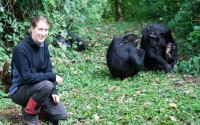Evolution of Language: what do chimpanzees have to say?
- Date
- 24 Nov 2015
- Start time
- 7:30 PM
- Venue
- Tempest Anderson Hall
- Speaker
- Dr Katie Slocombe

Evolution of Language: what do chimpanzees have to say?
Dr Katie Slocombe, Department of Psychology, University of York
Human language is incredibly complex and working out when and why it evolved is a great challenge. One promising approach to this problem is to look for similarities and differences between human and non-human primate communication. This can help us understand which elements of language are relatively new and unique to humans and which are likely to have evolved much longer ago. We know that chimpanzees, our closest living relatives, are similar to humans in many ways (intelligent, complex social relations, culture) but we know relatively little about their vocal communication. I will present studies from the wild and captivity that assess if there are any similarities between chimp and human communication. In particular, we will look to see if chimpanzees can use their vocalisations to communicate about external events, whether they produce their calls intentionally and whether they can learn the structure of calls from others.
Due to unforeseen circumstances this lecture is a change to the programme originally published.
Member’s report
Referential communication is an ancient ability and by studying chimpanzees, the last common ancestor of humans, psychologists hope to understand more about the evolution of human mental abilities. Chimpanzees vocal communication about external objects in the world was closely observed in the wild in Uganda, and in captivity in Edinburgh Zoo. One question was Why do chimps give food grunts? Is it excitement or an involuntary response to the food, or are they sharing information about the food?
It was discovered they rarely call when alone. Experiments over two years in Uganda demonstrated that they direct food calls at high-ranking friends only. It was the same with alarm calls; seeing a python produced a call only when specific individuals in their social group were present. In Edinburgh, when chimps from Holland were introduced to the host group, there was some evidence of modification of calls. The Dutch chimps positive food calls for apples became closer to the pejorative calls of the host group. More needs to be discovered in this ongoing research project on the language of chimpanzees.
Catherine Brophy